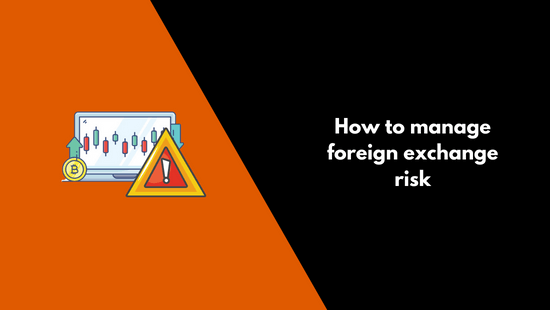
Are you a Forex trader looking to protect your investments from foreign exchange risk? If so, then in this article, I’ll share my tips on how to reduce exposure to unwanted risk while still taking advantage of lucrative opportunities in the foreign exchange market. Together we’ll explore ways to diversify portfolios across different currencies, use hedging techniques such as forwards and options contracts, and develop long-term plans to capitalize on changing economic conditions around the world. So join me as we delve into the world of managing foreign exchange risk!
Contents
What Is Foreign Exchange Risk?
As a forex trader, understanding the role of foreign exchange risk management is key. It’s an essential part of trading that can’t be ignored – currency risk needs to be addressed and managed to reduce potential losses. There are several strategies on how you can do this, such as hedging or limit orders.
At its core, FX (foreign exchange) risk is all about managing exposure to fluctuating prices in different currencies. By using hedging techniques, traders can protect against any sudden shifts in currency values which could have negative impacts on their positions. For example, if they’re long EUR/USD but fear it may fall soon, they might buy some USD/JPY contracts to offset the risk.
FX risk management isn’t just for experienced traders; even beginners should be aware of the risks associated with trading multiple currencies at once and take steps to mitigate them where possible. Setting stop-losses and taking regular profits are two simple yet effective ways of doing so.
Additionally, there are many more advanced tools available that provide detailed analysis of your trades and help manage FX risks more efficiently. All of these methods will give you greater control over your portfolio and help keep you safe from unexpected swings in market sentiment.
Types Of Foreign Exchange Risk
The world of foreign exchange trading is an ever-changing one, and the risk involved requires careful management. It’s like a chess game: you must make all your moves with caution and prepare for any eventuality that might arise. The types of foreign exchange risks are varied, but they can be divided into two main categories – bank exchanges and exchange rate risk.
Bank exchanges involve taking on currency fluctuations by buying or selling currencies at different rates across various banks. This type of risk involves analyzing changes in the global financial system to determine when it is advantageous to buy or sell certain currencies. It also requires knowing about international banking regulations so as not to get caught up in risky transactions.
On the other hand, managing currency volatility through exchange rate risk means understanding how the movements of specific currencies may affect their value against another. In this case, traders need to consider factors such as political instability, economic shifts, and geopolitical events that could cause significant shifts in currency values.
By utilizing both bank exchanges and exchanging rate risk, forex traders can effectively manage foreign exchange risks while still profiting from potential opportunities presented by changing markets conditions.
They must stay informed about current market trends and use technical analysis tools to identify entry points and exit strategies in order to maximize profits while minimizing losses due to unexpected fluctuations. Additionally, having knowledge of macroeconomic principles and central bank policies will help them anticipate how these elements could influence the overall FX market environment.
10 Tips To Manage It
It’s a widely accepted theory that managing foreign exchange risk is no easy task. But nothing should be impossible if you have the right tools and knowledge on how to go about it. Below I’ll outline 10 tips to help traders manage their FX risks more effectively.
- First, let’s start with understanding what currency pair you’re trading in and why. Knowing this can aid your decision-making when determining which trades are best for you.
- Next, try diversifying your portfolio across different currencies. This way, even if one of them drops, the other will likely rise or stay flat and give some sort of offsetting effect – thus reducing overall losses from any particular trade.
- Thirdly, make sure to keep tabs on political events as well as economic releases around the world; these can significantly influence rates and therefore could lead to large changes in profitability over short periods of time.
- Fourthly, know when to hedge by using derivatives such as options contracts or futures to protect against sudden adverse movements in price.
- Fifthly, always remember to monitor market sentiment since so many factors affect prices beyond simple economics and politics; often times ‘the herd’ may act irrational but still move markets in ways we must account for when hedging our positions!
- Sixthly, take advantage of forward contracts or swaps to lock in an exchange rate now at today’s prices instead of relying on future availability which could change drastically due to volatile markets conditions – especially during times where uncertainty reigns supreme (e.g., Brexit).
- Seventhly, look into currency arbitrage opportunities whenever possible; this involves taking two simultaneous long/short positions in order capitalize off discrepancies between spot & forward rates plus cross-rate differences amongst major pairs like EUR/USD versus USD/JPY – usually done quickly before those spreads close up again!
- Eighthly utilize stop-loss orders wherever feasible; setting predetermined maximum loss points helps ensure that losses don’t accumulate until they become unmanageable while also giving us more control over our trades than simply hoping things turn out alright…
- Ninthly pay attention to margin requirements set by each broker so we don’t end up overleveraging ourselves too much which can severely dent profits if not managed properly!
- Lastly never forget about tax implications either – depending on your jurisdiction there might be certain benefits or liabilities associated with holding various forms of currency (or derivative instruments) so do research accordingly!
Conclusion
In conclusion, foreign exchange risk is something all forex traders should be aware of. It’s a complex issue that can have serious consequences if not managed properly. Thankfully, there are steps we can take to minimize our exposure and protect ourselves from potential losses due to currency fluctuations.
Finally, By following the tips outlined above, you’ll give yourself a much better chance of making informed decisions when trading forex and help ensure your financial security for years to come.



